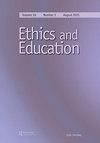Lessons on knowledge transmission from Plato’s allegory of the cave: the influence of reason and companionship on transmissive and participatory pedagogies
IF 0.7
Q3 EDUCATION & EDUCATIONAL RESEARCH
引用次数: 0
Abstract
ABSTRACT In this paper, I show the ambiguities in the interpretations of Martin Heidegger and Alain Badiou of Plato’s allegory of the cave as an enlightening educational experience. In Heidegger’s interpretation, knowledge appears as a rational process that corrects the thinking of others. By his claim of an education by truths, Badiou prioritises, again, the Platonic event of knowledge. To indicate the limit of the rational process in these two interpretations of education, I introduce Jan Masschelein’s claim that knowledge transmission in Plato’s cave story can be seen as a process where the immanent experience of companionship comes before the instruction of knowledge. The arguments in this article will be discussed in a broader context that explains how transmissive and participatory pedagogies have been influenced by the view of education as a process of rationality and companionship, and how the various approaches have either constrained or broadened the learner’s perspective.柏拉图洞穴寓言对知识传播的启示:理性与陪伴对传播与参与教学法的影响
在本文中,我展示了马丁·海德格尔和阿兰·巴迪欧对柏拉图洞穴寓言作为启蒙教育经验的解释中的模糊性。在海德格尔的解释中,知识表现为一种纠正他人思维的理性过程。巴迪欧主张通过真理进行教育,他再次强调了柏拉图式的知识事件。为了指出这两种教育解释中理性过程的局限性,我介绍Jan Masschelein的观点,即柏拉图洞穴故事中的知识传播可以被视为一个过程,在这个过程中,内在的陪伴经验先于知识的指导。本文中的论点将在更广泛的背景下进行讨论,以解释传播式和参与式教学法如何受到教育作为理性和陪伴过程的观点的影响,以及各种方法如何限制或拓宽学习者的视角。
本文章由计算机程序翻译,如有差异,请以英文原文为准。
求助全文
约1分钟内获得全文
求助全文

 求助内容:
求助内容: 应助结果提醒方式:
应助结果提醒方式:


